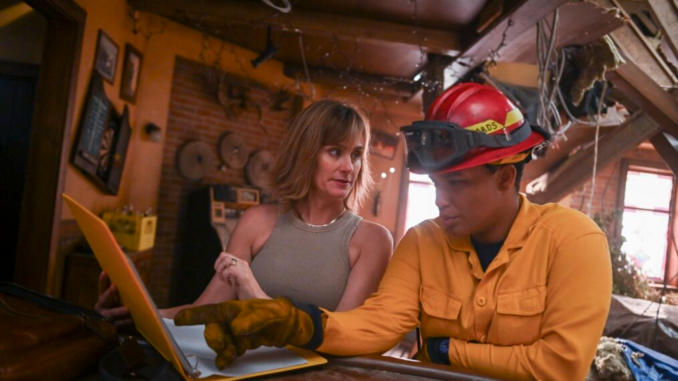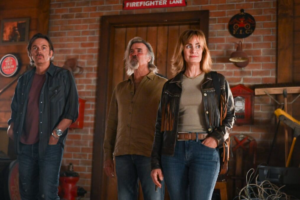
Fire Country Stars Tease More Obstacles For Vince & Sharon In Season 3: “They’re Always Going To Be Back And Forth”
Fire Country season 3 returned to CBS on Friday, October 18, and, unsurprisingly, started with a bang. The premiere sees Diego and Gabriela’s wedding interrupted by a helicopter crash that sends Station 42 into action. Bode takes the opportunity to do what he does best, acting as an unofficial firefighter during the crisis. The newest batch of episodes has greatly differed from Fire Country’s previous installments, with Bode being a free man for the first time in the series’ history.
The protagonist’s release from prison has a major impact on everyone, but his parents, Vince and Sharon, are two of the characters it affects the most. Billy Burke (Twilight) and Diane Farr (Splitting Up Together), who play the married couple, share that the surprising twist provides new storytelling opportunities for the Leone family. While Vince and Sharon have long since proven their unconditional love for one another, the actors tease that they will continue to face new obstacles throughout the show.
Screen Rant interviews Burke and Farr about Fire Country season 3’s major change, their characters’ relationship, and Sharon’s outlook on life following her near-death experience.
The Fire Country Cast Was Excited About Bode’s Newfound Freedom In Season 3
“It obviously gives us the ability to go so many more places with Bode’s character.”
Screen Rant: Bode being released from prison is a massive departure from the first two seasons. How does that impact your characters and the overall story as season 3 continues?
Billy Burke: It obviously gives us the ability to go so many more places with Bode’s character, for sure, and the ongoing miasma of the Leone family unit and all those dynamics. These first few episodes have really been about how to integrate him back into the community, back into the family, and at the same time, having him do what he does this season.

Diane Farr: It affects everything so much just from the production standpoint. We are the only show I’ve ever even seen where the protagonist, your number one, the star of your show, couldn’t go to the main set. He was never allowed in the firehouse, so it kind of fragmented the show in a lot of ways. You were working on his set or the fire set, or we were in a fire in the field together.
We were all excited about what it was going to open up for us. For Sharon, it begs this question of legacy, which I think is the theme of the whole season. If my job isn’t to save my kid that’s failing, what is my job? We’re all firefighters, and like in real life, we all have passions outside of it. I think Sharon had to come to the reckoning of, “I can’t get this involved in his life anymore. I’m going to stall him. So who am I going to be if that’s not my heart’s focus?”
How would you describe Sharon and Vince’s relationship throughout season 3?
Billy Burke: It seems that we’ve gotten past the tougher parts of the health issues with both of them, and as sketchy as it gets sometimes, and as cats and dogs do sometimes, I’m not sure which one’s the cat, which one’s the dog, but they’re always going to be back and forth. I’m pretty convinced that they will always find a way through those things because they are the kind of the heartbeat of the family element of this show.
Diane Farr: They’re in a good place, but it’s like they have reverse empty nest syndrome who gets an adult child back at 31 that they haven’t lived with in maybe 14 years. Sharon and Vince have to figure out how to make each other come first instead of the firehouse or their child. That’s where we are having our bumps.
This is the first show I’ve ever been on where I play the matriarch, where I play the archetype of the female holding all the heart pieces. And inherently in that idea is you skip your love life, you skip your partner. I have three kids of my own. It was really hard to balance having a romantic partner who was their dad and the three kids. Sharon’s got to figure out how to do both of those things.
Sharon Is Trying To Figure Out Who She Is Outside Of Parenthood In Fire Country Season 3
“She lost one child, and then she lost the other one. As we saw, the firefighting job was a means to an end to save her kid.”
Sharon has been through a lot. She accepted her death in season 1, and then season 2 is when she really had to bounce back from that. What would you say her overall outlook is after having been through something that traumatic?
Diane Farr: I think, because the theme has been legacy, Sharon’s question is, “Who am I now?” which stems from, “Who am I now if I’m not saving my child?” She lost one child, and then she lost the other one. As we saw, the firefighting job was a means to an end to save her kid. She was willing to burn the job or do things wrong in the job. She’s trying to figure out who she is now if her job isn’t to save her kid. She’s not good at it right away. It’s a process.
Sharon has a slightly different issue this season, which is an issue I had in my own real life. I went to the writers and said, “Can we show this?” For six episodes, she has to figure out a health thing that isn’t related to her kidney that sort of consumes her. It takes her a while to figure it out. That’s also feeding into, “Who do I want to be if I’m not just here to rescue my kid? If my own health is going to go down the drain trying to do it, why don’t I just save Sharon? Because that might hurt him more.”
Vince went through some health issues in season 2, and as you said, this is new territory with Bode being free. How do you feel about the trajectory of Vince’s storyline?
Billy Burke: I think he’s done pretty well coming off of whatever that heart condition was. Whether or not any of that’s going to resurface, I don’t know. It hasn’t yet in this season, but he’s plugging along pretty well. There is some setup right now that we’ve been doing in the first half of the season. I talked to the writers this summer about some ideas.
I don’t particularly know where it’s going, but I know that they have implemented some of the stuff that were just little brainchilds that I had. I’m very excited to see where any of that goes. It’s never going to be specifically what I was thinking, but that combination of, “Oh, here’s an idea. Where are we going to run with that?”
Farr Directed And Starred In Fire Country Season 3, Episode 3, “Welcome to the Cult”
“That was really hard. I was warned not to do it on the first day. Learn how to direct first and then learn how to direct and act.”
I also want to ask about Luke and his relationship with Vince. I’d say he redeemed himself pretty well with the transplant.
Billy Burke: Luke is probably going to do some d*cky stuff, because that’s sort of what he does. He comes in and endears himself and then does something a little suspect. As it stands right now, I think Vince and Luke’s relationship is as strong as it will be.
Diane, what was it like directing Episode 3 of this season while also acting in the scenes?
Diane Farr: That was really hard. I was warned not to do it on the first day. Learn how to direct first and then learn how to direct and act. So I did scenes I wasn’t in the first two days, and then I did fire scenes because that’s a different animal. And then I did scenes I was in, and then I did scenes I was in with fire.
Each layer was just one more level of confusion. I didn’t want to yell “action” to begin with. I thought it would be confusing to hear your colleague yelling “action,” but I was saying cut. So I’d literally be standing, as we’re talking on this little camera, and then stopping character and going, “Okay, let’s cut now.” That was weird every time.
About Fire Country On CBS
Inspired by series star Max Thieriot’s experiences growing up in Northern California fire country
Fire Country stars Max Thieriot (Seal Team) as Bode Leone, a young convict seeking redemption and a shortened prison sentence by joining a prison release firefighting program in Northern California, where he and other inmates are partnered with elite firefighters to extinguish massive, unpredictable wildfires across the region.
It’s a high-risk, high-reward assignment, and the heat is turned up when Bode is assigned to the program in his rural hometown, where he was once a golden all-American son until his troubles began. Years ago, Bode burned down everything in his life, leaving town with a big secret. Now he’s back, with the rap sheet of a criminal and the audacity to believe in a chance for redemption with Cal Fire.
Check out our Fire Country interview with Jules Latimer, as well.
